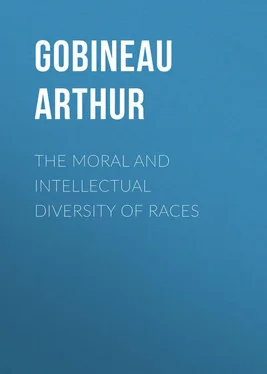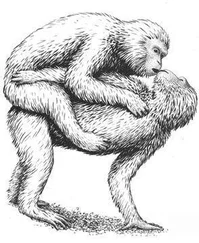Arthur Gobineau - The Moral and Intellectual Diversity of Races
Здесь есть возможность читать онлайн «Arthur Gobineau - The Moral and Intellectual Diversity of Races» — ознакомительный отрывок электронной книги совершенно бесплатно, а после прочтения отрывка купить полную версию. В некоторых случаях можно слушать аудио, скачать через торрент в формате fb2 и присутствует краткое содержание. Жанр: История, foreign_antique, foreign_prose, на английском языке. Описание произведения, (предисловие) а так же отзывы посетителей доступны на портале библиотеки ЛибКат.
- Название:The Moral and Intellectual Diversity of Races
- Автор:
- Жанр:
- Год:неизвестен
- ISBN:нет данных
- Рейтинг книги:4 / 5. Голосов: 1
-
Избранное:Добавить в избранное
- Отзывы:
-
Ваша оценка:
- 80
- 1
- 2
- 3
- 4
- 5
The Moral and Intellectual Diversity of Races: краткое содержание, описание и аннотация
Предлагаем к чтению аннотацию, описание, краткое содержание или предисловие (зависит от того, что написал сам автор книги «The Moral and Intellectual Diversity of Races»). Если вы не нашли необходимую информацию о книге — напишите в комментариях, мы постараемся отыскать её.
The Moral and Intellectual Diversity of Races — читать онлайн ознакомительный отрывок
Ниже представлен текст книги, разбитый по страницам. Система сохранения места последней прочитанной страницы, позволяет с удобством читать онлайн бесплатно книгу «The Moral and Intellectual Diversity of Races», без необходимости каждый раз заново искать на чём Вы остановились. Поставьте закладку, и сможете в любой момент перейти на страницу, на которой закончили чтение.
Интервал:
Закладка:
If communities have survived such fearful political tempests, it cannot well be said that national ruin is a necessary cause of misgovernment. Besides, wise and happy reigns are few and far between, in the history of every nation; and these few are not considered such by all. Historians are not unanimous in their praise of Elizabeth, nor do they all consider the reign of William and Mary as an epoch of prosperity for England. Truly this science of statesmanship, the highest and most complicated of all, is so disproportionate to the capacity of man, 48and so various are the opinions concerning it, that nations have early and frequent opportunities of learning to accommodate themselves to misgovernment, which, in its worst forms, is still preferable to anarchy. It is a well-proved fact, which even a superficial study of history will clearly demonstrate, that communities often perish under the best government of a long series that came before. 49
CHAPTER IV.
DEFINITION OF THE WORD DEGENERACY – ITS CAUSE
Skeleton history of a nation – Origin of castes, nobility, etc. – Vitality of nations not necessarily extinguished by conquest – China, Hindostan – Permanency of their peculiar civilizations.
If the spirit of the preceding pages has been at all understood, it will be seen that I am far from considering these great national maladies, misgovernment, fanaticism, irreligion, and immorality, as mere trifling accidents, without influence or importance. On the contrary, I sincerely pity the community which is afflicted by such scourges, and think that no efforts can be misdirected which tend to mitigate or remove them. But I repeat, that unless these disorganizing elements are grafted upon another more destructive principle, unless they are the consequences of a greater, though concealed, evil; we may rest assured that their ravages are not fatal, and that society, after a shorter or longer period of suffering, will escape their toils, perhaps with renewed vigor and youth.
The examples I have alleged seem to me conclusive; their number, if necessary, might be increased to any extent. But the conviction has already gained ground, that these are but secondary evils, to which an undue importance has hitherto been attached, and that the law which governs the life and death of societies must be sought for elsewhere, and deeper. It is admitted that the germ of destruction is inherent in the constitution of communities; that so long as it remains latent, exterior dangers are little to be dreaded; but when it has once attained full growth and maturity, the nation must die, even though surrounded by the most favorable circumstances, precisely as a jaded steed breaks down, be the track ever so smooth.
Degeneracy was the name given to this cause of dissolution. This view of the question was a great step towards the truth, but, unfortunately, it went no further; the first difficulty proved insurmountable. The term was certainly correct, etymologically and in every other respect, but how is it with the definition. A people is said to be degenerated, when it is badly governed, abuses its riches, is fanatical, or irreligious; in short, when it has lost the characteristic virtues of its forefathers. This is begging the question. Thus, communities succumb under the burden of social and political evils only when they are degenerate, and they are degenerate only when such evils prevail. This circular argument proves nothing but the small progress hitherto made in the science of national biology. I readily admit that nations perish from degeneracy, and from no other cause; it is when in that wretched condition, that foreign attacks are fatal to them, for then they no longer possess the strength to protect themselves against adverse fortune, or to recover from its blows. They die, because, though exposed to the same perils as their ancestors, they have not the same powers of overcoming them. I repeat it, the term degeneracy is correct; but it is necessary to define it, to give it a real and tangible meaning. It is necessary to say how and why this vigor, this capacity of overcoming surrounding dangers, are lost. Hitherto, we have been satisfied with a mere word, but the thing itself is as little known as ever. 50The step beyond, I shall attempt to make.
In my opinion, a nation is degenerate, when the blood of its founders no longer flows in its veins, but has been gradually deteriorated by successive foreign admixtures; so that the nation, while retaining its original name, is no longer composed of the same elements. The attenuation of the original blood is attended by a modification of the original instincts, or modes of thinking; the new elements assert their influence, and when they have once gained perfect and entire preponderance, the degeneration may be considered as complete. With the last remnant of the original ethnical principle, expires the life of the society and its civilization. The masses, which composed it, have thenceforth no separate, independent, social and political existence; they are attracted to different centres of civilization, and swell the ranks of new societies having new instincts and new purposes.
In attempting to establish this theorem, I am met by a question which involves the solution of a far more difficult problem than any I have yet approached. This question, so momentous in its bearings, is the following: —
Is there, in reality, a serious and palpable difference in the capacity and intrinsic worth of different branches of the human family?
For the sake of clearness, I shall advance, à priori , that this difference exists. It then remains to show how the ethnical character of a nation can undergo such a total change as I designate by the term degeneracy .
Physiologists assert that the human frame is subject to a constant wear and tear, which would soon destroy the whole machine, but for new particles which are continually taking the form and place of the old ones. So rapid is this change said to be, that, in a few years, the whole framework is renovated, and the material identity of the individual changed. The same, to a great extent, may be said of nations, only that, while the individual always preserves a certain similarity of form and features, those of a nation are subject to innumerable and ever-varying changes. Let us take a nation at the moment when it assumes a political existence, and commences to play a part in the great drama of the world's stage. In its embryo, we call it a tribe.
The simplest and most natural political institution is that of tribes. It is the only form of government known to rude and savage nations. Civilization is the result of a great concentration of powerful physical and intellectual forces, 51which, in small and scattered fragments, is impossible. The first step towards it is, therefore, undoubtedly, the union of several tribes by alliance or conquest. Such a coalescence is what we call a nation or empire. I think it admits of an easy demonstration, that in proportion as a human family is endowed with the capacity for intellectual progress, it exhibits a tendency to enlarge the circle of its influence and dominion. On the contrary, where that capacity is weak, or wanting, we find the population subdivided into innumerable small fragments, which, though in perpetual collision, remain forever detached and isolated. The stronger may massacre the weaker, but permanent conquest is never attempted; depredatory incursions are the sole object and whole extent of warfare. This is the case with the natives of Polynesia, many parts of Africa, and the Arctic regions. Nor can their stagnant condition be ascribed to local or climatical causes. We have seen such wretched hordes inhabiting, indifferently, temperate as well as torrid or frigid zones; fertile prairies and barren deserts; river-shores and coasts as well as inland regions. It must therefore be founded upon an inherent incapacity of progress. The more civilizable a race is, the stronger is the tendency for aggregation of masses. Complex political organizations are not so much the effect as the cause of civilization. 52A tribe with superior intellectual and physical endowments, soon perceives that, to increase its power and prosperity, it must compel its neighbors to enter into the sphere of its influence. Where peaceful means fail, war is resorted to. Territories are conquered, a division into classes established between the victorious and the subjugated race; in one word, a nation has made its appearance upon the theatre of history. The impulse being once given, it will not stop short in the career of conquest. If wisdom and moderation preside in its councils, the tracks of its armies will not be marked by wanton destruction and bloodshed; the monuments, institutions, and manners of the conquered will be respected; superior creations will take the place of the old, where changes are necessary and useful; – a great empire will be formed. 53At first, and perhaps for a long time, victors and vanquished will remain separated and distinct. But gradually, as the pride of the conqueror becomes less obtrusive, and the bitterness of defeat is forgotten by the conquered; as the ties of common interest become stronger, the boundary line between them is obliterated. Policy, fear, or natural justice, prompts the masters to concessions; intermarriages take place, and, in the course of time, the various ethnical elements are blended, and the different nations composing the state begin to consider themselves as one. This is the general history of the rise of all empires whose records have been transmitted to us. 54An inferior race, by falling into the hands of vigorous masters, is thus called to share a destiny, of which, alone, it would have been incapable. Witness the Saxons by the Norman conquest. 55But, if there is a decided disparity in the capacity of the two races, their mixture, while it ennobles the baser, deteriorates the nobler; a new race springs up, inferior to the one, though superior to the other, and, perhaps, possessed of peculiar qualities unknown to either. The modification of the ethnical character of the nation, however, does not terminate here.
Читать дальшеИнтервал:
Закладка:
Похожие книги на «The Moral and Intellectual Diversity of Races»
Представляем Вашему вниманию похожие книги на «The Moral and Intellectual Diversity of Races» списком для выбора. Мы отобрали схожую по названию и смыслу литературу в надежде предоставить читателям больше вариантов отыскать новые, интересные, ещё непрочитанные произведения.
Обсуждение, отзывы о книге «The Moral and Intellectual Diversity of Races» и просто собственные мнения читателей. Оставьте ваши комментарии, напишите, что Вы думаете о произведении, его смысле или главных героях. Укажите что конкретно понравилось, а что нет, и почему Вы так считаете.












